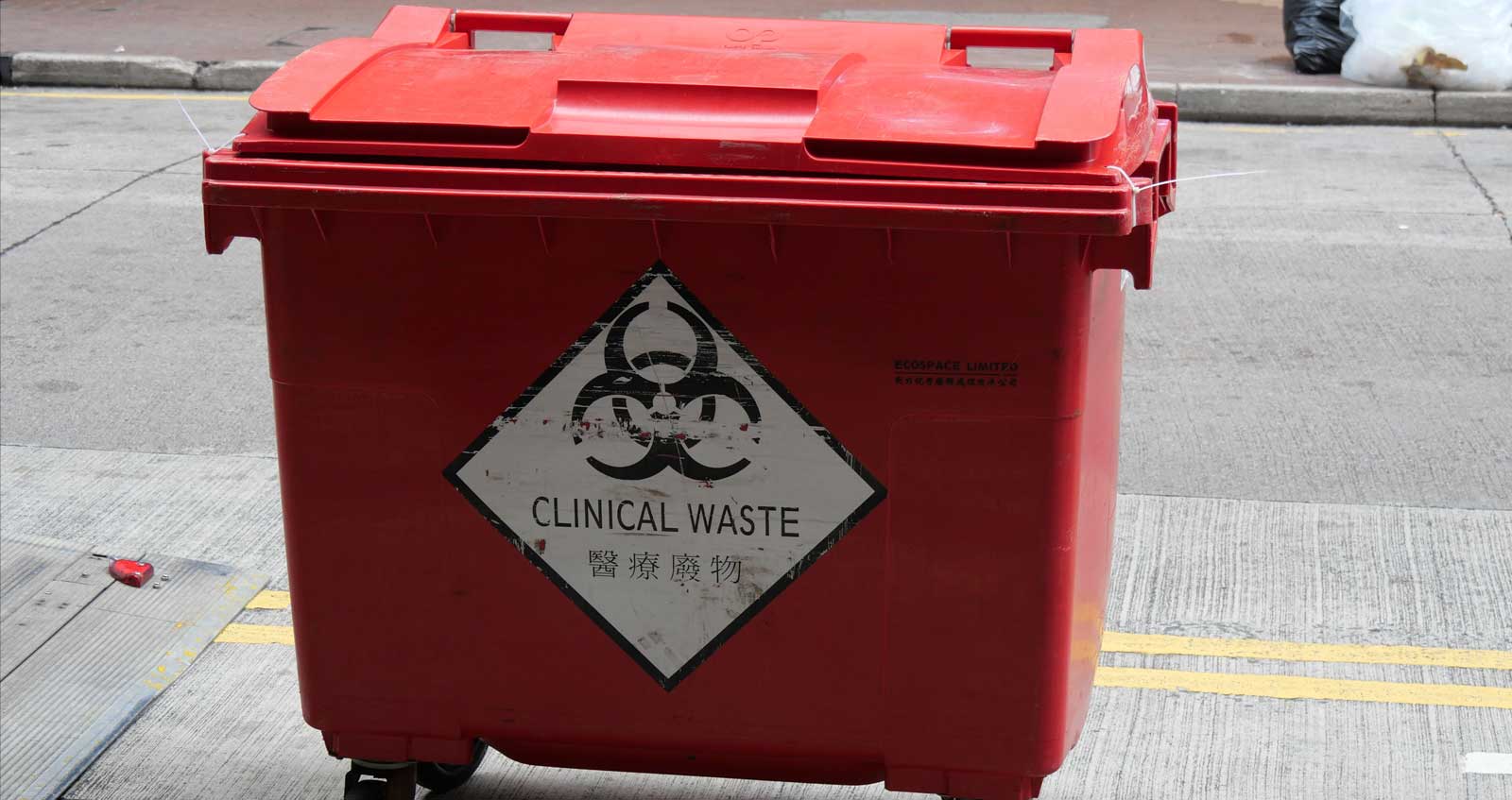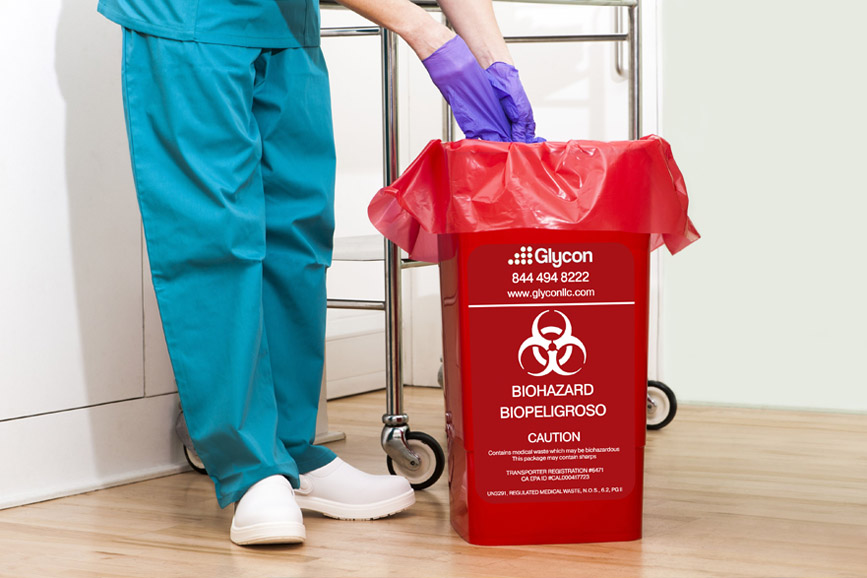Decreasing Risks and Protecting Public Health: The Duty of Medical Waste Disposal
In today's globe, where public health and wellness problems are frequently on the surge, the proper monitoring and disposal of medical waste play a vital duty in lowering risks and securing the wellness of areas. By delving right into this subject, we will uncover the critical role clinical waste disposal plays in shielding public wellness and the environment.
Significance of Appropriate Medical Garbage Disposal
Proper clinical waste disposal is of utmost significance in ensuring the safety of health care employees and the public. medical waste disposal services with WasteX. Clinical waste, that includes things such as utilized needles, syringes, contaminated materials, and pharmaceutical waste, postures significant wellness risks if not dealt with effectively
The primary reason for correct medical garbage disposal is to protect against the transmission of transmittable conditions. Healthcare employees are particularly susceptible to having and spreading out diseases with direct exposure to infected waste. By implementing suitable disposal techniques, such as utilizing puncture-resistant containers and ensuring the appropriate segregation of different kinds of waste, the threat of infection can be minimized.
Additionally, proper medical waste disposal is essential for protecting the setting. Some clinical waste includes hazardous chemicals and materials that can infect soil and water resources if not taken care of appropriately.
In addition to protecting human wellness and the atmosphere, proper clinical waste disposal also plays a duty in preserving the credibility and trust of health care institutions. Correct disposal methods show a commitment to safety and security and expertise, which is necessary for preserving public self-confidence in healthcare solutions.
Risks Linked With Inadequate Medical Waste Management
Insufficient medical waste administration poses considerable risks to public health and wellness and the setting. Incorrect disposal of clinical waste can result in the spread of contagious conditions, contamination of water sources, and the launch of toxic chemicals right into the setting. Among the key dangers related to inadequate medical waste monitoring is the transmission of infections. When medical waste, such as used syringes or infected dressings, is not gotten rid of effectively, it can enter into contact with people, bring about the spread of conditions such as HIV, liver disease B, and tuberculosis.
One more danger is the contamination of water resources. Improper disposal of clinical waste can result in the release of damaging chemicals and microorganisms into water bodies, polluting the water and presenting a threat to both animal and human wellness. This contamination can take place through the improper disposal of drugs or the discharge of untreated medical waste right into water bodies.
In addition, poor clinical waste administration can lead to the release of harmful chemicals into the setting. Several clinical items include harmful compounds, such as mercury, lead, or radioactive products. If these products are not thrown away correctly, they can leach into the dirt or water, positioning a risk to environments and human health.

Effective Approaches for Medical Waste Handling
Carrying out reliable and secure methods for the handling of medical waste is vital in ensuring the defense of public health and the atmosphere. Clinical waste, such as sharps, infected materials, and pharmaceuticals, can posture significant threats otherwise taken care of properly. To reduce these threats, medical care facilities must take on reliable techniques for clinical waste handling.
Proper segregation involves separating various kinds of waste at the factor of generation. Medical care centers ought to supply clear guidelines and training to staff on how to segregate waste properly.
Another vital approach is using safe and secure containers (medical waste disposal services with WasteX). Medical waste needs to be stored in puncture-resistant and leak-proof containers that are classified appropriately. These containers ought to be safely near to prevent any spills or leakages throughout transport and storage space. Regular assessments and upkeep of these containers are essential to ensure their stability.
Proper documentation is likewise vital for effective clinical waste handling. Medical care facilities need to keep exact documents of the kind and quantity of waste produced, in addition to the disposal methods used. This documentation helps in tracking and surveillance waste monitoring techniques, making certain conformity with guidelines, and determining areas for renovation.
Lastly, medical care centers should develop clear procedures for the transportation and disposal of clinical waste. This consists of working with credible and certified waste management firms that comply with proper handling, treatment, and disposal treatments. Routine audits and inspections need to be carried out to validate compliance with regulations and market ideal techniques.

Laws and Standards for Medical Waste Disposal
To ensure the appropriate and risk-free monitoring of clinical waste, healthcare facilities should follow guidelines and regulations established by appropriate authorities. These guidelines and standards are placed in place to safeguard public health and wellness, stop ecological contamination, and decrease the danger of infectious diseases.
In several nations, such as the USA, the monitoring of clinical waste goes through stringent guidelines implemented by federal government companies such as the Epa (EPA) and the Occupational Security and Health Administration (OSHA) These laws lay out the needs for the partition, packaging, labeling, storage, transport, and disposal of clinical waste. medical waste removal near me. They additionally supply guidelines on the use of individual protective devices (PPE) and the application of infection control steps
Healthcare centers are needed to develop and implement detailed medical waste monitoring prepares that address all aspects of waste handling. These strategies must include treatments for waste segregation, making use of ideal containers, worker training on waste management techniques, and routine surveillance and auditing of waste handling procedures.
Furthermore, medical care centers must preserve accurate documents of their waste management tasks and ensure that garbage disposal is medical waste disposal services with WasteX performed by certified and licensed waste administration companies (medical waste disposal services with WasteX). Non-compliance with these policies can result in penalties, penalties, and lawful effects
Advantages of Safe Medical Waste Disposal for Public Health And Wellness
Appropriate adherence to policies and guidelines for clinical garbage disposal not only makes sure the risk-free administration of waste but also supplies considerable advantages for public health and wellness. The risk-free disposal of medical waste plays a crucial duty in preventing the spread of infectious diseases and shielding the health of medical care employees, people, and the basic public.
One of the main advantages of risk-free medical garbage disposal is the decrease of disease transmission. Clinical waste, such as used needles and infected materials, can nurture contagious pathogens that posture a severe risk to human wellness. By appropriately segregating, product packaging, and throwing away medical waste according to guidelines, the potential for illness transmission is decreased. This, consequently, aids to maintain a safe and tidy medical care atmosphere.
In addition, safe medical garbage disposal additionally helps to reduce ecological air pollution. Improper disposal of medical waste can result in the contamination of air, dirt, and water, which can have detrimental effects on environments and public wellness. By adhering to proper disposal protocols, the risk of environmental pollution is reduced, making sure the well-being of both people and the environment.
Furthermore, appropriate clinical garbage disposal techniques additionally add to the total performance and sustainability of medical care systems. By applying risk-free disposal approaches, health care facilities can decrease the risk of accidents, injuries, and infections amongst their personnel, causing enhanced productivity and reduced healthcare prices.
Verdict
In conclusion, guaranteeing proper clinical waste disposal is important for reducing dangers and protecting public wellness. By implementing risk-free clinical waste disposal practices, we can secure public wellness and create a healthier setting for all - try this out medical waste removal near me.
In today's world, where public health and wellness problems are continuously on the increase, the correct management and disposal of medical waste play a vital duty in reducing dangers and securing the wellness of areas. By diving right into this subject, we will certainly uncover the pivotal function medical waste disposal plays in securing public health and wellness and the setting.
Inappropriate disposal of clinical waste can lead to the launch of harmful chemicals check this site out and pathogens into water bodies, contaminating the water supply and positioning a danger to both human and animal health and wellness.In final thought, guaranteeing proper medical waste disposal is essential for decreasing dangers and safeguarding public health and wellness. By executing safe medical waste disposal techniques, we can safeguard public wellness and develop a much healthier atmosphere for all.